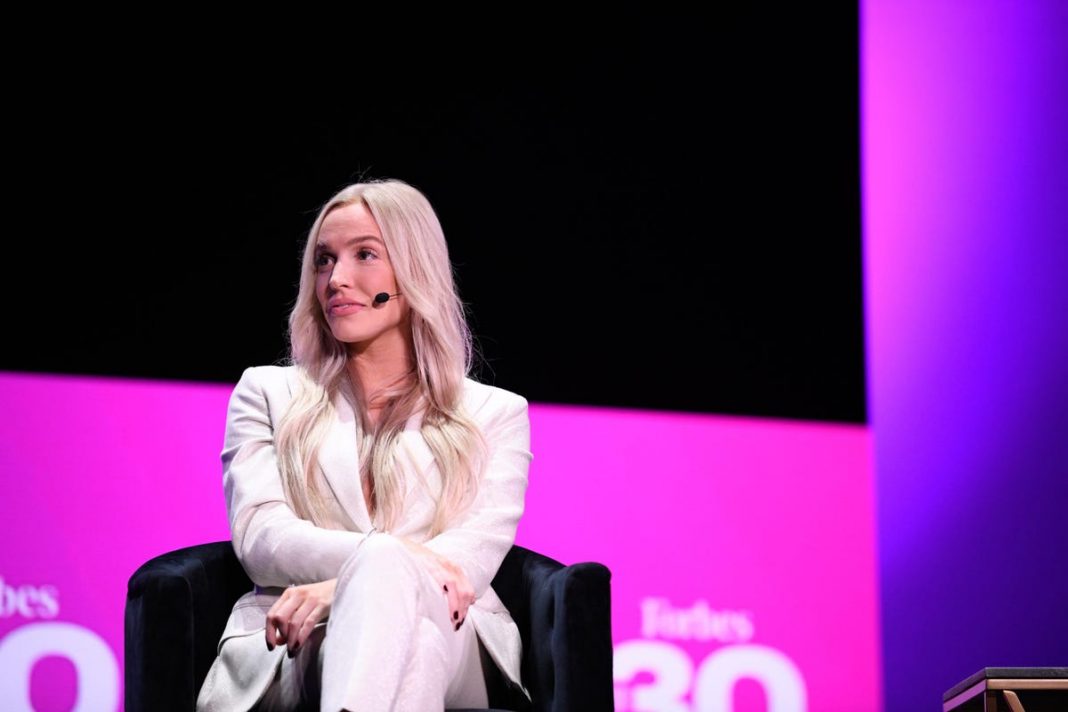“Every platform right now is so oversaturated and everyone is essentially trying to replicate or copy. Don’t do that. Because if you try to do that you’re just another spinoff,” Call Her Daddy host Alexandra Cooper told the Under 30 audience in Detroit on Tuesday.
Angelo Merendino for Forbes
After Forbes invited “Call Her Daddy” host and cofounder Alexandra Cooper to speak at the Forbes Under 30 Summit in Detroit, editors received notes from some of Cooper’s listeners urging a reconsideration. The messaging in Cooper’s podcast, they alleged, is unhealthy for young people; it promotes a toxic hook-up culture and is misogynistic.
“I get that all the time,” Cooper said of this criticism from the Under 30 stage on Tuesday. “The concept, I think, in the beginning of cancel culture was, ‘let’s have it be accountability culture.’ I think unfortunately what’s happened is the concept of groupthink has spiraled and so you have people who don’t have a large platform [trying] to take down people who have large platforms. I think they enjoy it, unfortunately.”
Cooper, who cofounded “Call Her Daddy” with Sofia Franklyn in 2018, is somewhat used to being a lightning rod for attention. She admits that first iteration of the podcast was “raunchy and wild,” featuring conversations about sex and relationships that “were challenging the patriarchal playbook.” (The name of the show itself is, according to the Wall Street Journal, a play on calling a male sex partner “daddy.”)
“The hate is always going to be there. I have a good dynamic with it now because it makes me money. A click is a click is a click, you know?”
Cooper and Franklyn hosted the show on Barstool Sports (a platform not exactly known for its feminism), and it quickly took off, growing from 12,000 downloads to two million in just two months. The duo’s partnership imploded during contract renegotiations with Barstool in 2020, and for the last year, Cooper has been its solo host while mostly declining to speak on or for Franklyn.
In June, Spotify announced it would bring “Call Her Daddy” exclusively to its platform; the deal was worth a reported $60 million over three years.
“[Cooper’s audience is] devoted in a way that’s hard to find,” Dawn Ostroff, chief content officer at Spotify, told Time about the deal in July. “They feel personally connected to her and they feel personally connected to one another.”
Cooper clarified on Tuesday that for all the money Spotify is giving her for access to this audience—and she demurred when offered a chance to confirm the $60 million figure—she still owns all of her content. “I’m only licensing it to Spotify. So after three years, I can either re-license it or sell it,” she said.
Call Her Daddy creator Alexandra Cooper (right) told Forbes assistant managing editor Diane Brady (left) that her parents gave her the tools to be where she is today. “My mom was the mom who was like, speak up. Use your voice,” Cooper said.
Angelo Merendino for Forbes
The ownership of the show’s intellectual property was at the heart of Cooper’s dispute with Franklyn, but Cooper stands by her decision to hold onto her IP. “I know the amount of time that I put into this brand—every single Instagram caption every single post, I still do to this day, I don’t have an intern that does it for me, the brand’s voice is so my own—and I knew that the minute that I would hand that over, it would lose the authenticity that once was the beginning of why everyone was so attracted to it,” Cooper told the Under 30 audience.
While the future evolution of “Call Her Daddy” is still up in the air, Cooper says she’s proud of how the show has already evolved. Dissecting the taboo is still at the heart of most episodes, but if the first iteration focused on the sexual taboo, the current iteration wants to put mental health issues in the forefront. And if the first iteration of the show was focused on salaciousness, the current iteration is focused on a word Cooper never thought she’d use: responsibility.
“I have millions of people each week listening to me, and genuinely being affected what comes out of my mouth. And so in the past, maybe where I was more flippant… [now it’s] understanding that’s going to affect a woman in her room, and she’s gonna feel like s—t about herself because I made a joke about XYZ,” Cooper said.
This isn’t to say that Cooper has completely changed her approach, or plans to, on account of an audience’s reaction.
“The hate is always going to be there,” she said. “I have a good dynamic with it now because it makes me money. A click is a click is a click, you know?”




